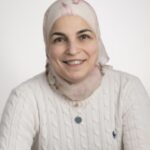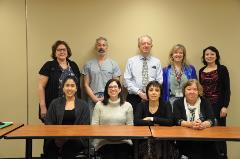About Maternal Fetal Medicine
The McMaster University division of maternal fetal medicine (MFM) is located at the McMaster University Women’s and Children’s Hospital. We We are a group of Maternal Fetal Medicine specialists.
McMaster University has always been innovative in all aspects of medical and inter-professional education. This is no less true for our undergraduate, postgraduate and subspecialty training programs.
For information about maternal fetal medicine electives, please visit our electives page.
About the Program
The fellowship program is a two-year program fully certified by the Royal College of Physicians and Surgeons of Canada. We have the capability of accepting Canadian and International trainees. Fellows have intensive time in clinical MFM, prenatal diagnosis, ultrasound and research, in addition to other elective and selective opportunities. We see a high volume of fetal anomalies, in addition to a spectrum of maternal conditions. Surgical training includes diagnostic procedure such as amniocentesis and chorionic villus sampling, cerclage placement and complex caesarean sections, among others.
Our program has the flexibility to enable fellows’ career goals. Historically, we have had trainees concurrently complete masters programs and the clinician investigator program.
Another of the strengths of our program, as noted by the fellows, is that there is a clinic specifically for patients to be managed by the fellow for new consultations and follow up visits. The fellow has input into the types of patients that are booked. MFM faculty supervise the clinic and there is increasing autonomy over the course of the program. This is a horizontal experience that continues as a commitment throughout rotations (other than elective). Residents have consistently praised this experience, noting it gives them a high degree of independence and allows them to mature in their clinical judgment, which are both essential to a smooth transition to independent practice.
Additionally, the relative low volume of fellows at our centre, compared to some other training programs, ensures that our fellows have excellent exposure to unique and interesting clinical and procedural opportunities.
Hamilton itself offers many advantages as a city. It is central with respect to liaising with other MFM units. There is ease of access to Toronto and London for not only MFM-related issues but cultural, travel and other activities. There is a large amount of green space and, since it is on the Bruce Trail, excellent hiking and other outdoor activities are possible.
Research
There are six blocks for research during the fellowship. Each fellow meets with a departmental research coordinator and a clinician-scientist in the department, upon their arrival, to discuss their previous research experiences, potential areas of interest and career goals. Opportunities with various MFM faculty are discussed, as there are a wide array of research interests amongst the faculty. Once the fellow has selected a research topic, the departmental research coordinator sets up specific modules. These modules are taught by various faculty and are meant to guide the resident through key steps in developing a research project. The goal is to ensure the fellow’s efficient progress towards contributing to the literature in a meaningful way. The fellow should exit this program with a solid foundation in research skills and be on their way to establishing a research program in their future faculty role.
Setting up multicentre research projects is possible and feasible within the time span of the fellowship. For instance, a recent graduate from the fellowship established a multicentre collaboration with University of Toronto and published results in the British Journal of Obstetrics and Gynecology during her two-year fellowship. When presenting the results of this study, the fellow earned the award for best MFM poster at the University of Toronto/McMaster MFM – Neonatology Research Day.
We also encourage collaboration between departments, especially for larger scale studies investigating outcomes, like quality of life or cost-effectiveness. We have strong relationships with other departments at McMaster, which allows for creativity and exploration in research that goes beyond what could typically be managed by a single specialty or group.
Our fellows are consistently invited to present their research at prestigious national and international meetings and have successful publications in well-respected journals.
Please visit our contact page for the departmental research coordinators’ contact information.
Following Graduation
Upon graduating from our training program, all recent fellows have been immediately successful in obtaining a full-time position in different academic tertiary care centres across the country. Many have remained active with scholarly endeavors during their faculty appointments.
Application Process
We are proud of our program and our MFM graduates. We work well together. We receive very positive feedback from our fellows. Our division would welcome interested applicants to apply.
Starting January 1, 2025, we will accept applications for the 2026/2027 academic year. The deadline date for 2026/2027 applications is July 1, 2025 with interviews to follow prior to the Match Day. Virtual interviews will take place in August.
Please note that international medical graduates are encouraged to apply. Applications are considered following the Canadian Match Day.
For further information on how to apply, required documentation and to submit your application, please use the Fellowship Application Portal. Incomplete applications with missing documents will not be considered.
Reference letters are to be addressed to the program director and emailed directly to the fellowship program coordinator. Under the reference section of the application, please upload a document listing your referees and their contact information.
Inquiries regarding the program should be emailed to the fellowship program coordinator.
Program Director
Information Box Group

Gharid Nourallah Bekdache
Assistant Professor, MFM Fellowship Director
Maternal Fetal Medicine

